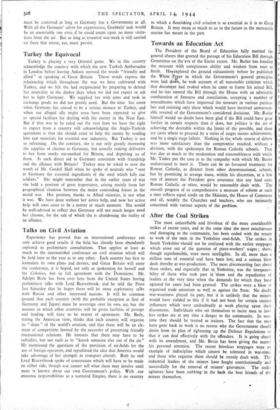Towards an Education Act
The President of the Board of Education fully merited the general cheers that greeted the passage of his Education Bill through Committee on the-eve of the Easter recess. Mr. Butler has handled the measure with conspicuous ability and wisdom from start to finish. He* explored the ground exhaustively before he published the White Piper in which the Government's general principles were laid dosTn, he took account of all reasonable criticism which that document had evoked when he came to frame his actual Bill, and he has steered the Bill through the House with an admirable combination of firmness and conciliation, accepting -a number of amendments which have improved the measure in various particu- lars and resisting only those which would have involved unwarrant- able reversal of the Government's considered decisions. Mr. Butler himself would no doubt have been glad if the Bill could have gone farther in certain respects than it does, but politics is the art of achieving the desirable within the limits of the possible, and there are cases where to proceed by a series Of stages means achievement, and by a single stage failure. Nothing In the whole course of debate was more satisfactory than the compromise reached, without a division, with the spokesmen for Roman Catholic schools. That was due as much to the moderation and reasonableness with which Mr. Tinker put the case as to the sympathy with which Mr. Butler endeavoured to meet it. There can be no favoured treatment for Roman Catholic, as distinct from other denominational, schools, but by promising to arrange loans, within his discretion, at a low rate of interest the President gave assurance that any hard case, Roman Catholic or other, would be reasonably dealt with. The smooth progress of so comprehensive a measure of reform at such a time reflects equal credit on the Minister, the House of Commons and all, notably the Churches and teachers, who are intimately concerned with various aspects of the problem.


























 Previous page
Previous page